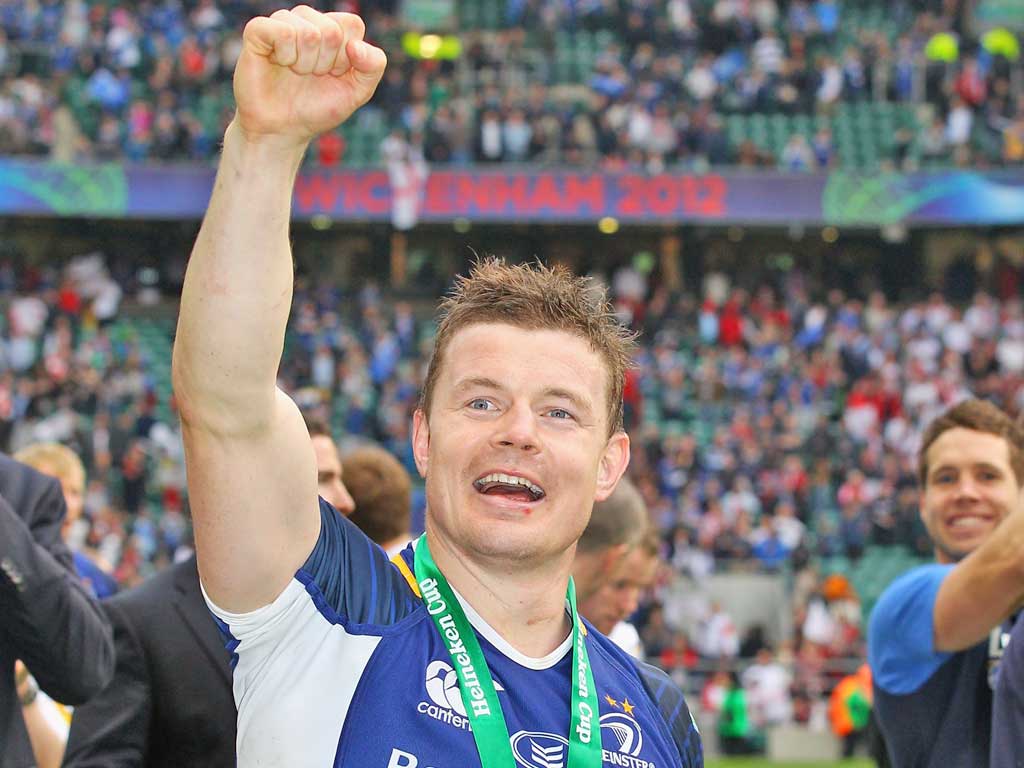Simon Turnbull: Leinster join pantheon of great sporting teams
The Way I See It: The comparison is perhaps not so much to the Bayern Munich of Gerd Müller as to the Ajax of Johan Cruyff

It was some Saturday evening for the boys in blue. It was a momentous, memorable win for them in their grand European final. It wasn't such a bad night for Chelsea either.
An hour or so before the drama started to unfold in Munich, in the annual final of the continent's showpiece club football competition, the players of Leinster were parading around Twickenham with the big prize from rugby union's equivalent of the Champions League, the Heineken Cup. They were celebrations with a special meaning.
For Didier Drogba and Co, their dramatic back-from-the-brink penalty shoot-out success – played out in front of a 69,901 crowd in the Allianz Arena – gained Chelsea their first hold on the prized tin pot formerly known as the European Cup. For Brian O'Driscoll and the Leinster boys in blue, their thumping, record 42-14 victory against Ulster in front of an 81,744 Twickenham crowd earned a third Heineken Cup in four years.
Toulouse, long regarded as the Real Madrid of European rugby, have lifted the trophy four times but never enjoyed such a dominant spell. Their successes came in 1996, 2003, 2005 and 2010. Leinster have been the champions in 2009, 2011 and 2012.
The last club to lift European football's most prized trophy three times in such a short space of time was Bayern Munich, with a hat-trick of wins in 1974, 1975 and 1976. They had the most famous No 13 in football history, although Gerd Müller wore the nine shirt when on club duty and 13 when banging in the goals for West Germany. He was a goal-poacher supreme – known as der Bomber – with tree-trunk thighs, a low centre of gravity and an unerring eye for the target.
O'Driscoll is a similarly built, similarly talismanic figure. At 33 and with 118 caps behind him, it is a wonder that the gladiatorial crash, bang, wallop of modern-day top-level rugby union has not reduced him to human rubble or at least blunted his cutting edge. He might not be quite as sharp as he was in his swaggering pomp – when he led the Wallabies a merry dance in Brisbane back in 2001 with the wondrous solo score that had the British and Irish Lions supporters singing "Waltzing O'Driscoll" – but, for all the ravages wrought by time, tide and brick outhouse opposition, the Dubliner remains the classiest of acts.
It was his sublime flip pass out to the charging Sean O'Brien that conjured the vital second try which put daylight between Leinster and Ulster on the Twickenham scoreboard eight minutes before half-time. It was easy to forget that eight days earlier the Ireland captain had been having keyhole surgery on his right knee. With 13 minutes remaining and Leinster 24-14 up, he hobbled off after being dumped on the deck by a clattering challenge. Six minutes later he was back on the field, playing a hand in the slick handling moves that yielded the fourth and fifth tries for his purring side.
When Leinster made their big breakthrough on the continental stage, with their maiden Heineken Cup final win against Leicester at Murrayfield in 2009, their 19-16 success was forged to a large part on the bulldozing play of the Wallaby blindside flanker Rocky Elsom. There were flashes of the deftness and precision out of hand that has since become a Leinster trademark.
Their forwards, as well as their backs, are as comfortable with ball in hand as the Harlem Globetrotters – only there is no meadowlarking or showboating with Leinster, just purposeful precision. Under Joe Schmidt, the Kiwi who succeeded Michael Cheika as head coach in 2010, they have become as proficient a club unit as any ever seen outside the southern hemisphere.
If there is a comparison to be made with the golden age of football's European Cup, it is perhaps not so much to the Bayern Munich of Gerd Müller as to the Ajax of Johan Cruyff.
They won the trophy three years in a row – in 1971, 1972 and 1973 – with a brand of play that became known as Total Football, with interlinking defenders and forwards as comfortable in possession as one another and often interchangeable. For all of the aces that Leinster hold behind their pack, all five of their tries on Saturday were scored by forwards, the third of them a penalty try forced by a driving maul.
Chelsea's success in Munich was a feat of sporting escapology, Didier Drogba playing the Houdini role after 88 minutes of entrapment. Leinster's triumph at Twickenham was a tour de force of power, pace and precision.
They racked up a record tally of points in a Heineken Cup final (the previous highest was 34 by Leicester against Stade Français at Parc des Princes in 2001) and a record haul of tries (the previous best was four by Brive against Leicester at the Arms Park in Cardiff in 1997).
O'Driscoll spoke in the aftermath of a "hunger for more" in the Leinster quest to create a European dynasty. Next year's final just happens to be in Dublin, which can only further whet the appetite of the burgeoning boys in blue.
Join our commenting forum
Join thought-provoking conversations, follow other Independent readers and see their replies
Comments
Bookmark popover
Removed from bookmarks